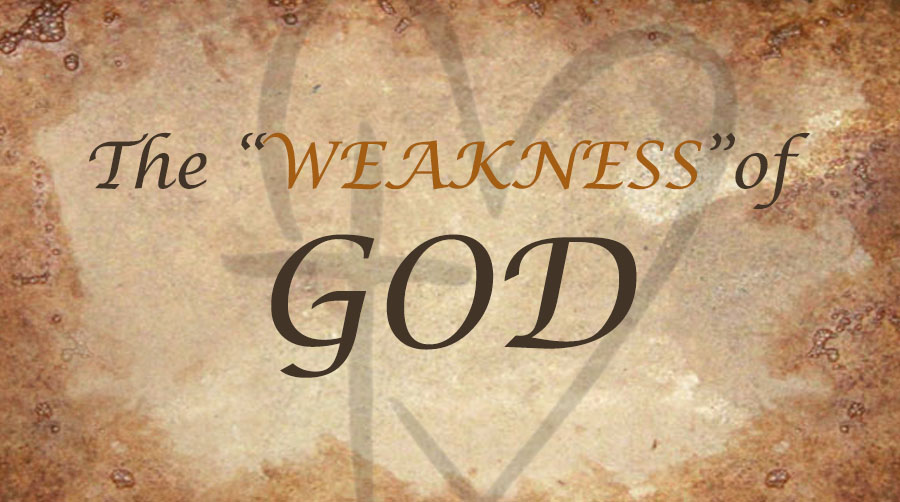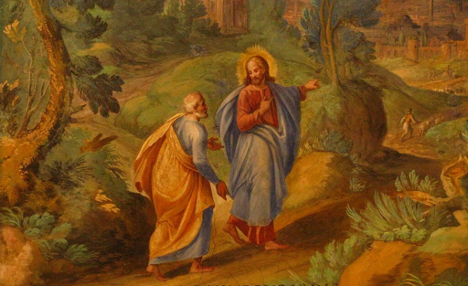“… the weakness of God is stronger than mankind”. 1 Corinthians 1:25b
This is, indeed, a captivating phrase penned by Paul – “the weakness of God”. The Greek word translated “weakness” is : asthenes[1], meaning “without strength”. There is a wonderful mystery in the many passages in which Paul speaks of “weakness”: It is OUR weakness which we give to God, He takes it and fills it (perfects, completes, finishes it) with His strength.
This is GOD’S METHODOLOGY “from before the foundation of the world” – in “The Lamb that was slain”[2], in His choice of Israel[3] and Gideon’s company[4], in the Cross of Christ – “the wisdom and power of God”[5], and now in the calling of the Church to make known (demonstrate) this wisdom to the powers and principalities[6].
God – and His power – dwells in our weakness.
9 “And He has said to me, “My grace is sufficient for you, for power is perfected in weakness.” Most gladly, therefore, I will rather boast about my weaknesses, so that the power of Christ may dwell in me. 10 Therefore I delight in weaknesses, in insults, in distresses, in persecutions, in difficulties, on behalf of Christ; for when I am weak, then I am strong.” (2 Corinthians 12:9-10)
The Church is supposed to be “weak” (meek).
That is to say, the opposite of the powers and principalities.
23 “But we preach Christ crucified, to Jews a stumbling block, and to Gentiles foolishness, 24 but to those who are the called, both Jews and Greeks, Christ the power of God and the wisdom of God. 25 For the foolishness of God is wiser than mankind, and the weakness of God is stronger than mankind.26 For consider your calling, brothers and sisters, that there were not many wise according to the flesh, not many mighty, not many noble; 27 but God has chosen the foolish things of the world to shame the wise, and God has chosen the weak things of the world to shame the things which are strong, 28 and the insignificant things of the world and the despised God has chosen, the things that are not, so that He may nullify the things that are, 29 so that no human may boast before God. 30 But it is due to Him that you are in Christ Jesus, who became to us wisdom from God, and righteousness and sanctification, and redemption, 31 so that, just as it is written: “Let the one who boasts, boast in the Lord.” (1 Corinthians 1:23-31)
This is the “great-er commission” of the Church:
9 “And to enlighten all people as to what the plan of the mystery is which for ages has been hidden in God, who created all things;10 so that the multifaceted wisdom of God might now be made known through the church to the rulers and the authorities in the heavenly places.” (Ephesians 3:9-10)
“The people whom I have formed for Myself will make known My attributes.”
The word I have to share is this:
In both the Old and New Testaments, scripture speaks of God forming a people to make known His attributes.[7] I particularly like the added detail provided in the Septuagint translation of Isaiah 43:21[8]: “My people whom I have formed[9] to show forth[10] My attributes.”[11] And similarly in 1 Peter 2:9[12]: “ … a chosen people, a royal priesthood, a holy nation, God’s special possession[13], to show forth the attributes of the One who called you out of darkness into His marvelous light”. This is one way in which the Holy Spirit has communicated to us “the whole counsel of God”. (Acts 20:27)
A specific aspect identifying this people is that they are a people who individually and collectively embrace their weaknesses. In the apostle Paul’s words, they “boast in their weaknesses”, for they know that “when they are weak, the power of Christ indwells their weaknesses, wherein His strength is made complete”. (2 Corinthians 12:9) In this 2nd epistle to the Corinthians, as well as in his other epistles[14], Paul mentions some examples of what he meant by “weaknesses”: “in infirmities[15], in insults, in distresses, in persecutions, in difficulties”. (2 Corinthians 4:7-18; 6:3-10; 11:23-27 & 12:10)
The “peculiar people”[16] God is forming for Himself are a people who embrace “weakness” as a quintessential aspect of their CALLING (1 Peter 2:21). It is, in fact, a calling which God intends for the Church – an even “great-er commission”, if you will – and that is to make known (show forth, demonstrate) to the powers and principalities the wisdom and power of God residing in the Cross of Christ. (Ephesians 3:10-11)
There is much to say about this people and their calling which I have discussed in another article[17], but this article will deal with a pre-requisite of being one of their number is a quality called “MEEKNESS”.
The Pre-requisite: “Meekness”
“Blessed are the meek, for they will inherit the earth.” (Matthew 5:5)[18]
The prerequisite to this inheritance is “meekness”. Jesus referred to Himself as “meek” (Matthew 11: 29); and as “the Church which is His Body” (Ephesians 1:23), we are to be like the Head of the Body (1 Corinthians 12:12) – namely, MEEK.
Meekness is an essential aspect of the divine nature of which we are partakers. (2 Peter 1:4) Thus, through imparting to us the divine nature, God’s purpose is to conform us to the image of His Son (Romans 8: 29), who is “meek and lowly[19] in heart”. (Matthew 11:29)
Resting in the Power of God
“The kingdom of heaven suffers violence, and violent men take it by force.” (Matthew 11:12)[20]
“The meek will inherit the earth.” (Matthew 5:5)
Violent men “posses” by force – children “inherit”.
“Meekness” is NOT weakness; but it embraces “weakness”. Meekness embraces weakness in the context of having faith in God. In THAT context, human weakness finds the strength and power of God. Weakness is having no resources in oneself upon which to draw. But meekness draws upon limitless resources in God.[21] Therefore, meekness is ultimately power. But the “power” then, is NOT to “possess the earth” in one’s own strength – as do “violent men” – but instead, to “inherit the land” through “childlike” faith in God’s strength to fulfill His promise.[22]
25 At that time Jesus said, “I praise You, Father, Lord of heaven and earth, that You have hidden these things from the wise and intelligent and have revealed them to infants…. 28 “Come to Me, all who are weary and burdened, and I will give you rest. 29 Take My yoke upon you and learn from Me, for I am gentle and humble in heart, and you will find rest for your souls. 30 For My yoke is comfortable, and My burden is light.” (Matthew 11:25, 28-30)
Meekness is the intentionality to find and enter into “His rest” in every circumstance and situation. Rest is the reward of faith and obedience. (Hebrews 3:18-19; 4:3-8) It is choosing to look to God and trust God in a given circumstance or situation, and intentionally rest from employing one’s own works in response to that circumstance or situation. (Hebrews 4:9-11) It is choosing to let God work rather than you work in a given circumstance or situation. In this sense, “rest” can be understood as a place – a place in the Spirit – rather than an actual ceasing of all activity.
* * * * * * *
“A Captivating Phrase” is an excerpt from the eBook: “The Weakness of God”, pages 4-13, 17-18. See the corresponding eBook and Audio Message on our website.
At Christ’s Table – ACTpublications © 2021
“Explaining spiritual realities with Spirit-taught words.” 1 Corinthians 2:13
* * * * * * *
FOOTNOTES
[1] Strong’s # 772
[2] Revelation 13:8; 1 Peter 1:20
[3] Deuteronomy 7:7
[4] Judges 7
[5] 1 Corinthians 1:18, 24, 30
[6] Ephesians 3:9-10
[7] Isaiah 43:21 AMP. See also: Psalm 102:18, Luke 1:17, and 1 Peter 2:9.
[8] “My people G2992 G1473 whom G3739 I procured; G4046 the ones G3588 [2my virtues G703 G1473 1to describe]. G1334 (Apostolic Bible Polyglot)
[9] Greek: peripoieomai, Strong’s # 4046: purchased, procured, formed.
[10] Greek: diegeomai, Strong’s # 1334: describe, declare, make known, show forth.
[11] Greek: arete, Strong’s # 703: virtues, excellencies, praise.
[12] But you G1473 G1161 [2race G1085 1 are a chosen], G1588 a royal G934 priesthood, G2406 [2nation G1484 1a holy], G39 a people G2992 for G1519 procurement; G4047 so that G3704 [2the G3588 3virtues G703 1you should publish] G1804 of the one G3588 [2from out of G1537 3darkness G4655 1calling you] G1473 G2564 into G1519 G3588 his wonderful G2298 G1473 light. G5457 (Apostolic Bible Polyglot)
[13] NASB
[14] 1 Corinthians 15:30-32; Galatians 4:13-15; 5:11; 6:7; 2 Timothy 3:10-11. Also see: http://www.biblecharts.org/apostlepaulcharts/15%20-%20The%20Sufferings%20of%20Paul.pdf
[15] Physical illness. Galatian 4:13-15. https://www.thenarrowpath.com/audio/verse-by-verse/2nd-corinthians/09_0000_2nd_Corinthians_12-13.mp3
[16] 1 Peter 2:9 KJV
[17] “The Cross & The Powers of Darkness”: Read: https://usr.helps7.com/AtChristsTable/PDF/Cross-Powers-Of-Darkness.pdf Listen: https://www.youtube.com/watch?v=XRDcD_WH9_0
[18] Cf. Proverbs 22:4
[19] Greek: tapeinos – humiliated, cast down, lowly
[20] For my explanation of this verse… “Seeing the Kingdom Through the Cross”, pp.12-15.
[21] This faith includes the works of faithfulness and obedience on our part. James 2:14-26 (also Hebrews 11). Therefore, one could never attribute compromise or failure to obey, to ‘meekness’. King Saul was an example of this type of compromise. 1 Samuel 15: 3 and 18-24. Under pressure of people, circumstances and situations, unfaithfulness and disobedience are moral WEAKNESS. Whereas MEEKNESS is the inner strength to be obedient and remain faithful to God even in the face of pressure from people, circumstances, and situations.
[22] In Matthew 5:5, Jesus is quoting Psalm 37:11, where it says, “The Meek will inherit the LAND.” “The land” speaks of the victories of inheriting God’s promises in this life. (Hebrews 13: 7; 6:12). ”The earth” refers to the “new heaven and new earth”. (2 Peter 3: 7, 10-13)


